- Home
- Thomas H. Cook
Instruments of Night Page 6
Instruments of Night Read online
Page 6
But more than anything, Mrs. Flexner had never once during his long year of silence pressured Graves to speak. She’d always seemed quite confident that one day he’d talk again, that given time and patience, his shattered heart would mend.
It was this simple faith in his ultimate recovery, Graves supposed, that had made Mrs. Flexner finally insist that Sheriff Sloane stop making periodic visits to question him.
Graves had been sitting in the old wooden swing when the sheriff came that last time, close enough to hear what he said to Mrs. Flexner as the two of them stood together in the front yard:
Martha, the fact is, what was done to Gwen Graves was the most terrible thing I’ve ever seen.
I don’t doubt that, Sheriff.
She was hung, ma’am. Hung from a beam and cut open. Like an animal. Yes, I know.
And it’s been almost a year, and right now I don’t know one bit more than I did when I started. There’s just one thing I know for sure. Whoever it was, he’s still out there somewhere. Free as a bird. Looking for some other young girl.
I know, Sheriff.
That’s what’s so frustrating. The fact that I don’t have a thing to go on. Just car tracks in the driveway, that’s all. The boy, there, he’s the only thing I got that’s even close to a witness.
But if Paul wasn’t at the house, what good can he do you?
Not much, I reckon.
Well, back when he was talking, he said he hadn’t seen a thing. Said he never came to the house that night. Said he slept in the field a mile away.
Yes, I know he said that.
Then what’s the good of keeping after him?
Graves had always remembered how Sheriff Sloane’s eyes had slid over to him when he gave his answer:
Well, if he didn’t go home that night, then what about the hoe?
The hoe?
Why wasn’t it with him when we found him in the field?
Where was it?
Inside the house. Near where his sister hung.
A shadow suddenly spread across the diner’s speckled Formica table top, startling Graves, jerking him back into the present.
“Will there be anything else, sir?”
Graves glanced up. The waitress had long, straight hair, and for an instant she seemed to hang above him, swinging slowly, suspended by a cord but still alive, her hands clawing at the rope, red and raw, blood flowing down her arms in gleaming rivulets.
“How about a warm-up?”
Graves shook his head. “No, nothing else.” His voice was a whisper.
She nodded and moved away, leaving him in the booth, the thick white coffee cup squeezed tight in his fingers. He could see the two men in green coveralls as they began to saunter toward the far corner of the street. He was still watching when they reached the end of the block. Then a truck swept by, blocking his view. Once it passed, the pair was gone.
He finished the last of his coffee, rose, and headed out of the diner.
Normally, he would have gone back to his apartment after having breakfast. But the thought of returning to his typewriter, to a scene in which Slovak stood on a narrow ledge, staring hopelessly into Kessler’s triumphant eyes, did not appeal to him. Instead, he decided to take a stroll, observe the great spectacle of the city on a bright summer morning.
He’d arrived in New York in the fall, only a month after his eighteenth birthday. He’d had nothing but the meager money he’d gotten from the sale of the family farm, but it had been enough to buy a bus ticket, rent an apartment, and keep him fed and clothed until he’d found a job. He’d never been in doubt as to why he’d come to New York. He’d seen it portrayed countless times in movies and magazines, a dense cityscape that was the exact opposite of the wide fields and empty woods and remote farmhouses of rural North Carolina, all of which filled him with a panicky sense of dread. The sheer density of the place, its teeming crowds, answered his need to surround himself with high walls, to walk streets that were never deserted. Once in the city, he’d moved into the most crowded neighborhood he could find, into the largest building on its most congested street, and in that building had chosen the apartment that had the thinnest walls. He would never again live in a place where screams could not be heard.
It was a tiny studio that looked out over the southwest corner of First Avenue and Twenty-third Street, and at night Graves took comfort in the proximity of his neighbors, the sounds they made as they came and went from their apartments. Morning and evening were best, but regardless of the hour he overheard a steady stream of life, people padding up and down the narrow corridor, chatting or bickering as they went. It never mattered what they said, only that they were so close. He needed only to feel their nearness, their vigilance, their eyes upon him, their ears listening. For he knew that the greatest evils required isolation. They were carried out in distant woods, deep basements, lonely farmhouses. Places out of sight. Out of reach. Where nothing stirred but the will to harm. Never to be entirely alone, that was the only safety. He had concluded that such nearness was the only protection against what others might do to you. Or what you might do to others.
It was nearly noon by the time Graves returned to his apartment. He made a ham sandwich and ate it at the wrought-iron table on the terrace. It had little taste, as all things did to him. He felt textures, the gristle in the meat, the slosh of what washed it down. All else was mere gruel.
After eating, Graves returned to his typewriter and once again sought a way out for Slovak. But once again, nothing came. And so after an hour of futile striving, he lay down in his bedroom, hoping a short nap might refresh him, or that a solution might suddenly present itself in a dream.
He’d been asleep for nearly an hour when the phone rang. He rolled over and plucked the receiver from its cradle.
“Hello.”
“Hello, Mr. Graves? Allison Davies. I hope I’m not disturbing you, but I wanted to know if you’d looked at the photographs I sent you.”
“Yes, I did.”
“And have you reached a decision about coming to Riverwood?”
Graves realized that, in fact, he had made his decision, that while he’d slept, his imagination had played a scene for him, one that existed in none of his books. In the scene, Slovak crawls through a dank, dripping tunnel to find the decomposed body of a little girl. Even as he crawls, he knows that her body has been decaying for days, that nothing is left but slime and maggots. And yet Slovak goes on, dragging himself through the stinking muck because he knows that this pile of rotten flesh was once a blue-eyed child, one whose mother still waits for him to bring her murdered daughter home.
“Mr. Graves?”
“Yes, I’m here,” Graves answered. In his mind’s eye he could see the photographs Miss Davies had sent him. They were still spread across the table in the adjoining room, Mrs. Harrison’s letter resting forlornly in their midst.
“Well, will you do it, then?”
He heard Slovak whisper in his ear. Sometimes you must do a thing because your own darkness will overwhelm you if you don’t.
It was a line he’d written years before, written in his first book. But now it seemed like nothing less than the old detective’s solemn admonition, the dying wish of someone Graves had long ago created and now come to revere, his weary, wasted questioner of Cain.
“Will you come to Riverwood?” Miss Davies asked.
He gave his answer achingly, like someone beaten into submission, the word dropping from his mouth like a broken tooth.
“Yes.”
PART TWO
Oh, please, please, please. .
—Paul Graves,
Uncommon Prayer
CHAPTER 7
The next morning Graves did his laundry, threw away the few perishables that had accumulated in his refrigerator, then arranged for Wendy, the young woman who lived next door, to pick up any mail he might receive while at Riverwood. She hadn’t bothered to look through the peephole before she’d opened it, and for a long time afte
r he returned to his own apartment, Graves found himself considering the things that might have been done to her had some other man been at the door, pressed his dusty boot against it, then pushed it open. He’d even briefly envisioned Sykes at work while Kessler sat nearby, barking orders—Use that. Stick it there—delighted by the horrors he could instruct another to perform.
To escape the mood such visions called up, Graves busied himself with the last of his chores, then packed a single suitcase—the same one he’d brought from North Carolina over twenty years before—and placed it beside the door. He put his typewriter in its carrying case and placed it beside the suitcase. That was it. There was nothing more to do. No plants to water. No animals to care for. No friends to notify of his move to Riverwood. He had nothing to nurture, nothing to protect. No one to whom anything of value should be entrusted. He’d given Wendy the key to his mailbox and the key to his apartment so that she could leave his mail on the kitchen table. He knew that when he returned, the usual accumulation of bills and third-class flyers would be waiting for him. There’d be no personal letters, however, no notes from relatives or friends. It was the path he’d chosen—a conscious choice—to live so stripped of human connection that when he died there would be no grief.
He read for the rest of the day, shifting from the sofa to the chair, from his desk to the small table by the window. At around six he made dinner, ate it quickly, then walked out onto the terrace and watched night fall over the city. In recent books Slovak had taken up the same twilight vigil, a lonely figure perched on a rusting fire escape, staring out over the jagged field of spires and chimneys. This merging of Slovak’s habits with his own did not trouble Graves, however. It seemed the inevitable consequence of the life they’d lived together. But while Slovak brooded about Kessler as he peered out over the city, working to unearth the force that drove the latter to such awesome acts of harm, Graves worked only to empty his mind of thought.
Once the darkness had settled over the city, Graves returned inside, stretched out on the sofa, and began to read again. The book was a huge nineteenth-century novel peopled with scores of characters, plots and subplots, a work whose vast sweep made his own novels appear puny, repetitive, limited in theme. And yet he could not write anything other than what he wrote, could not portray a single aspect of the human experience beyond Kessler’s evil, Sykes’ cowardice, and Slovak’s futile effort to bring them down.
He read for nearly two hours, then rose from the sofa, walked into the bedroom, and crawled into bed. He had just reached for the light, when he heard a hard thump on the other side of the wall. He knew that it came from Wendy’s bedroom, and for a time he listened anxiously for some other sound, a low moan, a cry of pain. Or something worse. A sound he recalled from the depths of his past, the soft, rhythmic pleading of a young woman, begging, however hopelessly, to live.
The next morning Saunders arrived at Graves’ apartment right on time. He was dressed more formally than before, white shirt, dark blue jacket, gray tie, but his manner remained no less casual.
“You look beat,” he commented as he placed Graves’ suitcase and typewriter in the trunk of the Volvo.
“I didn’t sleep much,” Graves told him.
Saunders opened the rear door and waited for Graves to get in. “Well, you can take a nap on the way to Riverwood if you want. I’ll turn on the air-conditioning, a little music. You’ll sleep like a baby, believe me.”
But Graves had not been able to nap, and so, after they’d been on the road awhile, Saunders glanced back toward him and laughed. “We made bets, you know. The staff, I mean. On whether you’d come back. Most of us figured you wouldn’t.”
Mention of the staff at Riverwood gave Graves a way of beginning his work.
“The people who work at Riverwood now,” he said. “Were any of them there the summer Faye Harrison was murdered?”
“Only Greta Klein,” Saunders answered. “She was one of the housekeepers then.”
Graves took the small notebook he’d purchased in a drugstore the day before, flipped back its cover, and wrote her name.
“Greta came to Riverwood right after the war,” Saunders added. “From Germany. Just sixteen and pretty as a picture.”
Graves saw a young girl with bright blue eyes and blond hair she’d painstakingly braided, two thick braids hanging neatly down the back of her carefully pressed blouse. She held a bulky suitcase in her hand, and in his mind Graves envisioned her standing on the steps of the main house, ringing the bell, waiting apprehensively for the door to open.
“She’d been through a lot, Greta had,” Saunders went on. “She was a refugee.” His eyes swept over to Graves. “She’d been in one of the camps, you know.”
Graves’ imagination immediately revised the story. Now Greta was dark, her hair straight and raven black. The white blouse was gone, along with the shiny black shoes. Instead, she was dressed in the tattered makeshift clothes of a Jewish refugee.
“I remember the day she arrived.” Saunders spoke so freely, with so little need of prompting, Graves felt sure he’d been instructed to do just that. “The whole family met her at the door. I took her upstairs and showed her the room we’d gotten ready for her.”
Graves saw a youthful Frank Saunders take Greta’s suitcase and guide the girl up the long flight of stairs that led to her tiny room, Warren Davies watching them from the foyer, the rest of his family gathered around him, all staring silently at the strange young creature who’d just come into their midst.
“Do you know how she happened to come to Riverwood?” Graves asked.
The question appeared to derail the progress of Saunders narrative, add a curve to the road. “No, not really,” he replied. “I guess she had some sort of connection to Mr. Davies. She had a picture of him. I remember that. She kept it in her room. On a little table by her bed.”
Graves instantly envisioned the photograph, Mr. Davies in an elegantly tailored suit.
“It was the only picture she had,” Saunders went on. “All her other pictures were destroyed, Greta told me. Gone up in smoke, she said. Like her mother, I guess. In the camp.”
In his mind Graves saw Greta’s mother huddled before a brick wall, naked, shivering. A Polish snow fell all around her, blanketing the burial pits. A river ran sluggishly in the background, its surface coated with a film of gray ash.
“Anyway, Greta was all alone in the world. I felt sorry for her. We all did. She tried hard to be accepted. She wanted to be the family favorite, you might say. But it never worked. That place was already taken.”
“By whom?”
“Faye Harrison,” Saunders replied. “Everybody loved Faye.”
The unexpected mention of Faye Harrison in connection with Greta Klein instantly generated a story in Graves’ mind. He envisioned Greta as she began to fashion a new life for herself at Riverwood. Alone, her family dead, he saw Greta as she made her first halting efforts to be accepted at Riverwood, cautiously approaching each member of the Davies family, but particularly Allison, a girl her own age and in whom she hoped to find not just a friend, but perhaps a sister. For a while it had seemed possible, and as he continued to imagine it, Graves saw the two girls together, Greta speaking haltingly in her heavily accented English, Allison listening quietly, the vastly privileged life of the one embracing the unspeakably tragic life of the other, their friendship steadily growing deeper and more intimate as the weeks passed, Allison now moving toward the idea that Greta should not live at Riverwood as a servant, but as a full-fledged member of the Davies family, the sister she had always wanted and never had.
And so it might have happened, Graves thought, had another girl not suddenly emerged from the shadows. Not a servant, but the daughter of a servant, a beautiful girl with shimmering blond hair, who spoke without an accent, an all-American girl who had never felt history roll over her like a cold black wave. Given her own terrible background, the depth of her need, how could Greta Klein not have hated Faye Harrison?
How could she not have wanted her dead?
To these questions regarding Greta Klein, Graves now added a third. Where had Greta been on the afternoon of August 27, 1946, when Faye Harrison was murdered? The very question threw up the single, chilling image of a dark, lonely teenager lurking in the forest’s depths, waiting silently as a girl came toward her, blue-eyed, with long blond hair and skin so luminous, it seemed almost to brighten the shadowy interior of the cave where Greta Klein crouched.
“You’ll be the first one at Riverwood,” Saunders said as the two of them sped along the New York State Thruway a few minutes later. “The other guest for the summer won’t arrive until this evening.”
Graves recalled the many empty cottages he’d noticed on his first visit to Riverwood. “There’s only one other guest?”
“There’re usually more. But Miss Davies wanted to keep things kinda quiet at Riverwood this summer. So it’ll only be you and the other guest. Eleanor Stern. Ever heard of her?”
Graves shook his head.
“Well, there’ll be a dinner in the main house tonight,” Saunders said. “You can meet her then.”
Saunders said little else during the rest of the trip, and so Graves took the time to think silently about the task before him. He glanced down at his notebook, at the single name he’d written there. Greta Klein. He knew that before the summer ended a great many more names would be added to it, a gallery of suspects, and that if he were successful, one of them would finally emerge from the rest, have both the motive and the means to kill a teenage girl.

 The Interrogation
The Interrogation Sacrificial Ground
Sacrificial Ground The Fate of Katherine Carr
The Fate of Katherine Carr What's In A Name
What's In A Name Blood Innocents
Blood Innocents Peril
Peril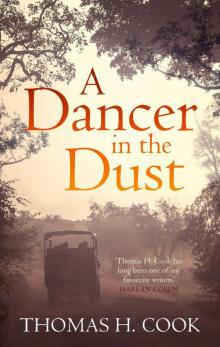 A Dancer In the Dust
A Dancer In the Dust Breakheart Hill
Breakheart Hill The Chatham School Affair
The Chatham School Affair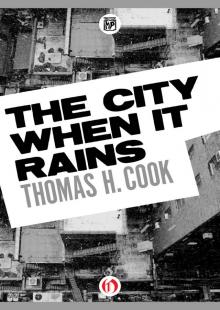 The City When It Rains
The City When It Rains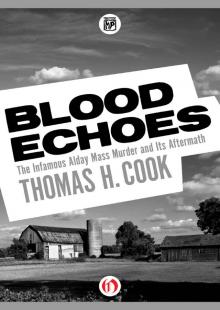 Blood Echoes
Blood Echoes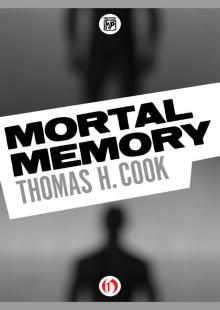 Mortal Memory
Mortal Memory Evidence of Blood
Evidence of Blood Into the Web
Into the Web The Crime of Julian Wells
The Crime of Julian Wells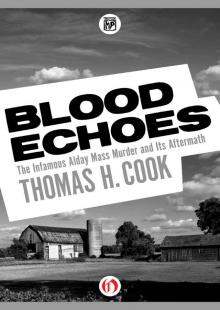 Blood Echoes: The Infamous Alday Mass Murder and Its Aftermath
Blood Echoes: The Infamous Alday Mass Murder and Its Aftermath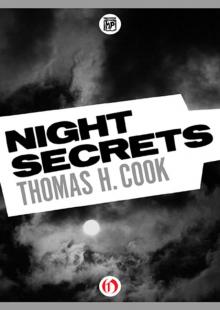 Night Secrets
Night Secrets Places in the Dark
Places in the Dark The Orchids
The Orchids Elena
Elena Streets of Fire
Streets of Fire Instruments of Night
Instruments of Night Sacrificial Ground fc-1
Sacrificial Ground fc-1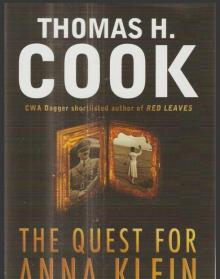 The Quest for Anna Klein
The Quest for Anna Klein Sandrine's Case
Sandrine's Case Quest for Anna Klein, The
Quest for Anna Klein, The Fatherhood
Fatherhood Flesh and Blood
Flesh and Blood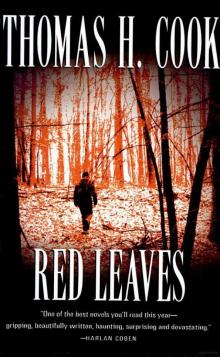 Red Leaves
Red Leaves